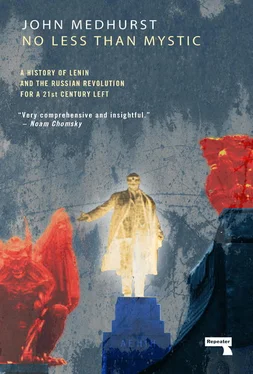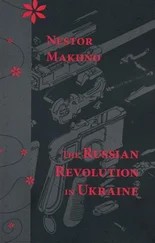The Soviet made one last attempt on the morning of 25th October to speak for itself. The day before, on the cusp of the insurrection, the Pre-Parliament, at which Mensheviks, Bundists and SRs still laboured to try to bring the government round to more radical policies, had heard from Kerensky that he had “incontrovertible proof” that the Bolsheviks were about to launch an insurrection. Kerensky then left for military headquarters to call for Cossack reinforcements. After his departure, the Menshevik leader Theodore Dan, who under Martov’s relentless pressure was detaching himself from Kerensky and beginning to move the Menshevik party further left, put a new resolution to the Pre-Parliament. Whilst it condemned the Bolsheviks for unilateral actions and for ignoring the wishes of the Soviet, it said clearly that the only way to defuse a Bolshevik insurrection was to instigate “decisive measures in the struggle for peace, an immediate transfer of landed estates into the hands of the peasants, and the speediest possible convocation of the Constituent Assembly”.
Dan blamed both the Bolsheviks and the Provisional Government for the chaos that would follow an insurrection. He suggested the best means to prevent subversion of the democratic revolution from both left and right was to establish a broad-based Committee of Public Defence. The resolution was passed 122 votes to 102, upon which Dan and SR leader Avram Gots took it to Kerensky and demanded its terms be implemented. Kerensky then argued with Dan and Gots about who was to blame for the imminent collapse of the government. Dan wanted the terms of the resolution, which might placate discontented workers and peasants, immediately posted around the city, but Kerensky was lost in fantasies of crushing the Bolsheviks. This last attempt by Mensheviks and SRs to head off the collapse of the government by dragging it sharply to the left was far too little, far too late.
By the morning of 25th October, the insurrection in Petrograd was virtually over. The Soviet woke up to a transformed capital. At 3pm on the same day, Trotsky announced to the Soviet:
In the name of the Military Revolutionary Committee I declare that the Provisional Government has ceased to exist. Individual Ministers are under arrest, the others will be arrested in the next few days or hours. The revolutionary garrison has dispersed the Pre-Parliament.
Trotsky claimed that the overthrow of the Provisional Government had so far proceeded without bloodshed. He went on to announce:
At the present time the Soviets of Workers’, Soldiers’ and Peasants’ deputies faces the historically unprecedented experiment of the creation of a regime which will have no other interest but the needs of the workers, peasants and soldiers. The state must be an instrument of the masses in the struggle of their liberation from all bondage.
After Trotsky had spoken, Lenin told the packed Soviet:
The oppressed masses themselves will form a government. The old state apparatus will be destroyed root and branch, and a new administrative apparatus will be created in the form of the Soviet organisations. Now begins a new era in the history of Russia, and this third Russian Revolution must finally lead to the victory of socialism. 17
But as Sukhanov, who was watching from the back row, put it in his invaluable history, “to construct (not merely a Soviet) but a ‘Proletarian Socialist state’ in a vast economically shattered peasant country, meant taking on oneself tasks known to be utopian”. 18
No such considerations were allowed to spoil the moment. No Mensheviks were given the podium. The Soviet, in a fit of enthusiasm, passed a motion which read:
The Soviet expresses its confidence that a Soviet government will firmly advance towards socialism, the only salvation of the country. The Soviet is convinced that the proletariat of Western Europe will help lead the cause of socialism to total victory.
When Trotsky suggested that commissars be sent throughout the country to inform the people what had happened in Petrograd, someone shouted from the floor, “You’re anticipating the will of the Congress!” Trotsky shot back, “The will of the Congress has been anticipated by the tremendous fact of the insurrection of the Petrograd workers and soldiers, which has taken place tonight”. 19
The night was not over. Trotsky had assigned MRC Secretary Vladimir Antonov-Ovseenko to lead the force to take the Winter Palace and arrest the Ministers. They had formidable assistance in the form of the cruiser Aurora , manned by Bolshevik sailors at anchor in the Neva River. The only forces left guarding the Winter Palace were ceremonial sentries, military cadets and a woman’s “shock battalion”. Kerensky had issued orders for Cossack regiments stationed outside Petrograd to enter the city to defend the government, but the Cossacks questioned his authority and decided to wait. Those few forces that did embark for Petrograd were once again obstructed and delayed by the All-Russian Union of Railwaymen.
When Antonov-Ovseenko’s forces reached the Winter Palace on dawn of 25th October, they encircled it and issued instructions to those within to surrender. They did not know that Kerensky was already on his way out of the capital. The Ministers who remained within ignored the demand to surrender and the small forces at their disposal set up barricades. The insurgents spent the day engaged in brief, desultory skirmishes with the defenders. Although up to 10,000 Bolshevik supporters milled around Palace Square throughout the day, by the evening they had dwindled to a few hundred men. Inside the Palace, the women’s shockbattalion and some cadets decided to leave. No one stopped them. Much of the city did not even notice anything was occurring. In the evening Nevsky Prospect bustled with crowds as usual and the theatres, restaurants and shops remained open. Taxis and streetcars ran across the city. Reports from district police chiefs on 25th-26th October all agreed it was a quiet night. 20
At 10pm the insurgents brought up armoured cars and issued an ultimatum that unless the Palace surrendered the Aurora would open fire. The Ministers decided that they would bluff it out and hope that reinforcements arrived soon. The Aurora fired blank shots across the Palace as a last warning, and there was gunfire between the Palace and besiegers. The Aurora then fired a 6-inch shell into the Palace which blew some walls in. At this point some of the Red Guards and sailors rushed into the Palace, but they met resistance and were disarmed. Over the next few hours further troops infiltrated the Palace and gradually, with desultory fighting, it passed into the hands of the insurgents. Antonov-Ovseenko marched into the cabinet room where the Ministers had been confined since the previous night and proclaimed, “I inform all of you, members of the Provisional Government, that you are under arrest. I am Antonov-Ovseenko of the Military Revolutionary Committee”.
Only then did the insurgents realise that Kerensky had escaped. Frustrated, the Red Guards yelled at the Ministers and threatened violence. Antonov-Ovseenko called them to order. “I’ll permit no violence!” he commanded. “Calm yourselves. Maintain order. Power is now in your hands”. The Ministers were taken to the Peter and Paul Fortress but not before one of them, P.N. Maliantovich, who later left an invaluable account of 25th-26th October in the Winter Palace, found Antonov-Ovseenko in the cabinet room writing a protocol establishing the removal of the Provisional Government. Once, before the war, the Menshevik Maliantovich had hidden the Bolshevik Antonov-Ovseenko from the Okhrana in his attic. Antonov-Ovseenko, suitably embarrassed at the turn of events, treated him courteously. After reading the proclamation aloud to Maliantovich, Antonov-Ovseenko paused and seemed to ponder the enormity of what the Bolsheviks had just done. “Yes”, he said, “it will be an interesting social experiment”. 21
Читать дальше












